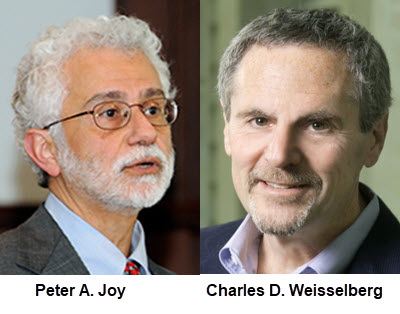Abstract
Excerpted From: Peter A. Joy and Charles D. Weisselberg, Access to Justice, Academic Freedom, and Political Interference: a Clinical Program under Siege, 4 Clinical Law Review 531 (Spring 1998) (38 Footnotes) (Full Document)
 Attacks on poor people's access to justice and on the academic freedom of students are not new. Perhaps it is only inevitable that as “real-client” law school clinical programs proliferate, these programs will sometimes become the target of politicians and others who disagree with the clinics' work. Many of us who teach in clinical programs have received inquiries from people outside of the law school community, such as alumni, legislators, or trustees, who ask why “the law school” is involved in a particular case. Most of these inquiries are benign, and alumni, legislators, and trustees are satisfied once they understand what law school clinics do and what they teach. Occasionally, however, the inquiries turn into full-fledged and serious attacks on the clinics and their universities. This introduction to the “Friends of the Court Submissions” before the Louisiana Supreme Court deals with a grave threat to clinical legal education in the State of Louisiana as well as to the program at Tulane University.
Attacks on poor people's access to justice and on the academic freedom of students are not new. Perhaps it is only inevitable that as “real-client” law school clinical programs proliferate, these programs will sometimes become the target of politicians and others who disagree with the clinics' work. Many of us who teach in clinical programs have received inquiries from people outside of the law school community, such as alumni, legislators, or trustees, who ask why “the law school” is involved in a particular case. Most of these inquiries are benign, and alumni, legislators, and trustees are satisfied once they understand what law school clinics do and what they teach. Occasionally, however, the inquiries turn into full-fledged and serious attacks on the clinics and their universities. This introduction to the “Friends of the Court Submissions” before the Louisiana Supreme Court deals with a grave threat to clinical legal education in the State of Louisiana as well as to the program at Tulane University.
In an effort to impede the work of Tulane's Environmental Law Clinic, business groups requested the Louisiana Supreme Court to change the state student practice rule to severely limit clinical students' ability to advocate for their clients. In response to these complaints, the Court is examining the state's student practice rule and the role of law school clinics in legal education. The Clinical Law Review is publishing edited versions of the submissions by the Association of American Law Schools (AALS) and the Clinical Legal Education Association (CLEA) to the Louisiana Supreme Court. These submissions will be of interest to clinicians and others since the submissions describe the development of law school clinical programs and address issues of access to justice, academic freedom, and professional responsibility in the clinical setting. It is also our hope that these submissions may serve as useful references for clinicians responding to inquiries about the clients they represent from forces outside of their law school communities.
[. . .]
At this writing, it is still unclear what action, if any, the Louisiana Supreme Court will take as it considers the proposed amendments to the Louisiana student practice rule. As argued in the submissions to the Court by the AALS, CLEA, and SALT, the Louisiana Supreme Court should not abdicate its responsibility for facilitating the high quality legal education provided by clinical programs, nor should it ignore the important academic freedom and ethical issues implicated by the proposed amendments to the student practice rule. If the Louisiana Supreme Court does modify its state's student practice rule, it will be a regrettable and unprecedented action that will threaten every clinical program that represents individuals and groups who turn to the courts for redress against more powerful interests.
Assistant Professor and Director, Milton A. Kramer Law Clinic, Case Western Reserve University Law School.
Professor, University of Southern California Law School.


